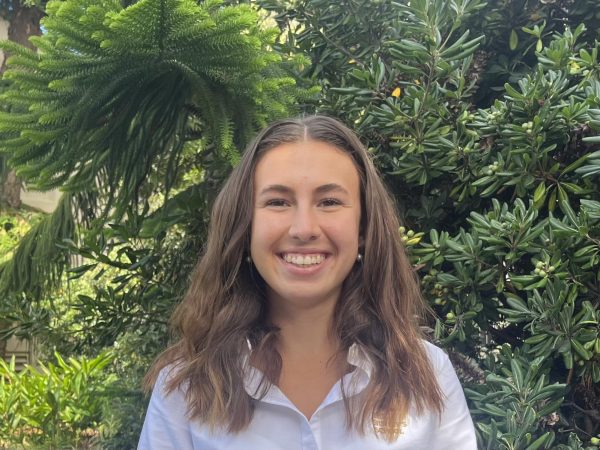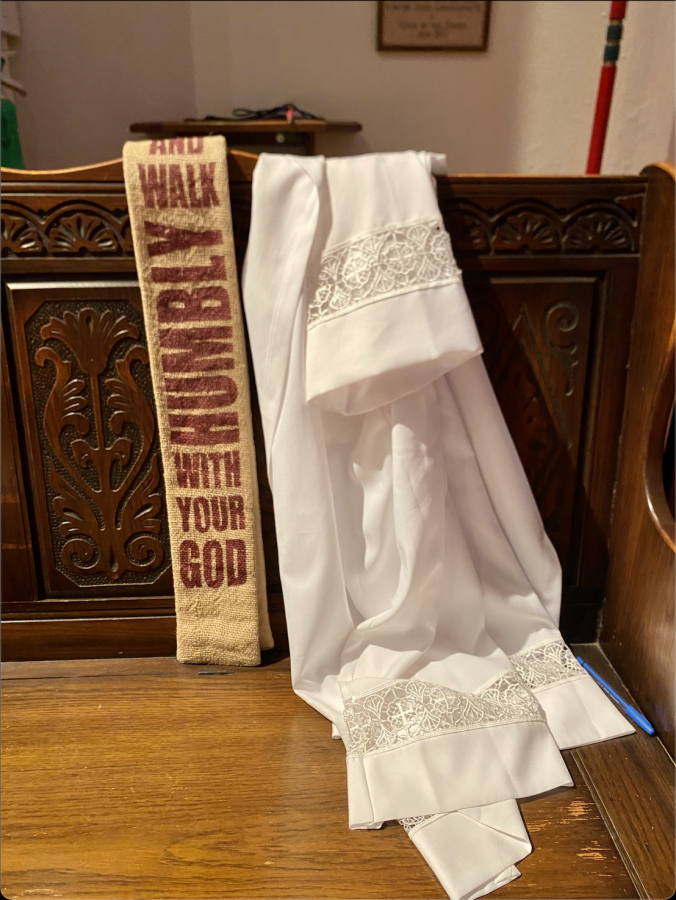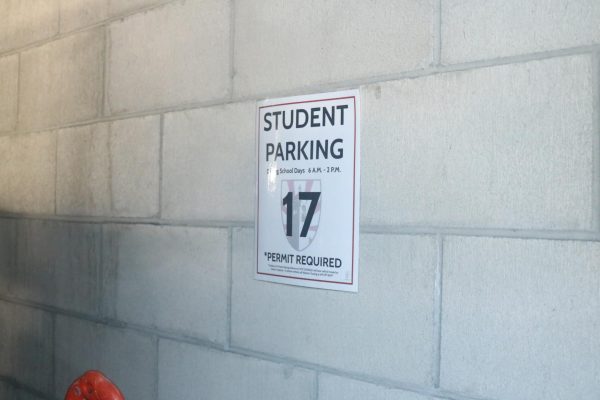New Compassion
Straying from traditional pastoral clothing, Revered Simopoulos wears light garments and a sash with written values clearly defined.
“Do justice, love kindness, and walk humbly.” The words we hear in chapel every time we depart were also the themes of recent years. However, this year’s chapel theme is compassion. What does that mean? How does that affect you?
While last year’s theme of justice centered around what it means to be fair and equal, this year’s theme of compassion flows from it. Reverend Nicole Simopolous tied the two together by saying that before justice there has to be compassion: “it is standing with, suffering with, being witness to [others’] suffering. Out of that compassion, we are motivated and inspired to want to change the system that’s causing the suffering.” Head of School Mr. Ron Kim adds to that, saying, “justice strikes me as a manifestation of compassion. To right what is wrong and to improve the condition of those who suffer requires us to care about someone else.”
In our DEIJ lessons, we’ve been defining compassion as empathy in action. If the first step in receiving justice is compassion, how do we understand compassion? The Latin root of compassion is to suffer with. It’s that ability to feel that pain and suffering as if it were your own but compassion is being able to act on it. Senior Chapel council member Saavi Banerjee (‘22) added on to that, claiming that it isn’t having pity, but it is an act where “you shouldn’t expect anything from it.” Juliette Levy (‘22) added onto the idea of selflessness by saying, “it is seeing vulnerability and not shying away. I think the most important part of compassion is to not always expect something in return. It comes from the heart, with no ulterior motives.”
This year, the idea of compassion is a looming idea for all discussion. For Saavi, this theme of compassion is leading her to give people “more second chances, and be more forgiving,” Saavi continued by saying, “I’m trying to give myself more grace and understanding that I’m going to make mistakes and that’s ok,” said Rev. Simopoulos when asked about how she shows compassion to herself. Juliette is trying to“ rebuild connection. I want to truly get to know people I haven’t been able to talk to, I hope others do the same. I want to take every chance I can to make each day worthwhile – for myself and for others.” Mr. Kim hopes that this year, he will be able to make it possible “for everyone to succeed to the best of their abilities, and for everyone to become their best selves.” For Adelaide Kessler (‘25), she hopes it “helps people nurture the supportive environment that Bishop’s is. When we show compassion for others we see the direct impact it has on all of our lives.”
Compassion is an idea that we were taught when we were little—to share toys or help someone up if they fall. So, why is this core moral principle the one that we have chosen to highlight for the year? Mr. Kim said, “I knew that I wanted to focus on well-being this year and in future years: pairing that with compassion made a lot of sense. Perhaps the most important thing is that we are explicit about our values and what we expect of this community.” Rev. Simopoulos added, “we can’t be well if we don’t have compassion for ourselves; wellbeing begins with loving ourselves and others.”
Once compassion was chosen as our theme, the process for planning our enrichment blocks began.
According to Rev. Simopoulos, enrichment blocks are planned around the idea that students have “more than one opportunity to explore and understand a topic.” First: Rev. Simopoulos made clear that students have three chances to explore an element of compassion (DEIJ, Health Lessons, and Chapel discussion). Each is planned by a select panel of teachers.
Director of Diversity, Equity, Inclusion & Justice Mr. David Thompson, Rev. Simopoulos, Associate Director of College Counseling Mr. AJ Jezierski, Mathematics teacher Ms. Jennifer Seymour, Spanish teacher Profe Carlos Martell, and History and Social Science teacher Ms. Mary-Ellen Kohlman plan the DEIJ meetings. In these meetings, they begin to plan out discussions for the upcoming cycle.
Rev. Simopoulos and the Chapel Councils plan chapel, and discuss who is going to talk and about what.
Director of Counseling Ms. Megan Broderick, English Teacher Ms. Jasmyn Tanner, Learning Resource Specialist Ms. Stephanie Ramos, and Dean of Students Ms. Michelle Shea plan our health lessons. Here they map out what they are going to focus on for the health lessons. Rev. Simopoulos said that through each of these three sections, they are “addressing the commitment to well-being and the core value of compassion.”
Mr. Kim presents the chosen themes to the boards, the boards work on applying them to us and to our daily lives and conversations in enrichments, chapels, and DEI.
Rev. Simopoulos listed out a few different ways she hopes it is incorporated into our daily lives including “be[ing] kinder to each other, think[ing] before we speak, giv[ing] each other more grace, and understand[ing] where someone is coming from.” She added onto that by claiming that these should be the “guiding principles for how we [can] be compassionate and how we [can] demonstrate compassion and listen with compassion.” Mr. Kim agreed, saying “if everyone on campus acted just a little more compassionately toward themselves and to others, we would all feel that we were part of a stronger community.”
Saavi summed it all up by saying that “sometimes compassion is taking a break when you need it.”

This is Leila’s fourth year on the staff and her second as Editor-In-Chief. Leila loves The Tower as much as she loves field hockey, peach Snapple, the...






